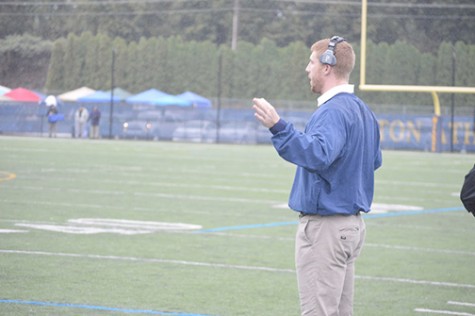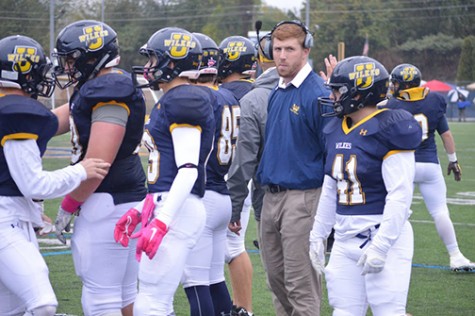Jeremy Hartman: back on the field as a Colonel
Jeremy Hartman, a 2014 Wilkes University graduate, traded in his shoulder pads and helmet for a clipboard and whistle this year.
Hartman was named the university’s assistant football coach at the start of this season.
Head Coach Trey Brown arranged for Hartman to play football in a different league post-graduation, but being fully involved with basketball as soon as his senior football season ended, Hartman was unable to commit to the original plan.
“That’s when coaching came up in conversation as an alternative,” Hartman explained. “I felt extremely honored to be working under Trey’s system and I was more than ready for the learning experience. He hired me as an offense coach for the tight ends, and that’s where it all began.”
Brown felt it was a great idea to bring Hartman on board.
“I told him, as with most things in life, you are never truly sure you want to do something until you do it,” he insisted. “I felt Jeremy, along with our other young coaches, could add a dynamic to the staff that was lacking last year.”
Considering this is not a typical move to make as a postgrad student, Hartman followed his gut feeling on the opportunity.
“The truth is you don’t get to play organized sports for your whole life, and coaching was something that seemed like the next best thing for me,” he said.
Though approaching the job with optimism, Hartman realized there is a fine line between playing and coaching. When a player, Hartman kept to himself in order to focus his performance. Now as a coach, he must motivate an entire team.
Another difficult aspect of the transition from player to coach was the idea of not being able to play at all.
“At practice, you see the guys kicking the ball and stretching, and you long to be back out on the field standing next to the guy who loves the game as much as you do,” Hartman said. “I always think to myself how much I wish I could sneak shoulder pads on and get on that field, but then I remind myself that everyone’s time ends eventually.”
Hartman also finds himself struggling to keep the mindset of a coach at all times instead of what previously was a player’s mindset.
“As a player, I had a humorous and a sarcastic attitude lots of times and tried to keep things fun when hardships would arise. That is the brotherhood aspect of it,” he said. “I have to remind myself that I cannot always be their buddy anymore, but instead a professional in the sense of helping to keep the players focused and not distracted by jokes.”
Hartman balances the role he is in now in dealing with his players on the team that had previously played with him side by side through accountability.
“We both hold on our end of the deal,” he said.
Working one-on-one with Hartman, the team’s tight end, Garrett Armstrong, loves learning from a longtime friend who he now thanks for helping him make an impact on the field.
“It was cool to see him go from a big asset of our team to now part of our coaching staff, especially since I am learning off of his own past experiences,” Armstrong said.
With an abundance of challenges, Hartman is humbled by the few similarities within being a player and a coach.
“That is a reason why I continued to stay here and start coaching,” he explained. “It is so hard to leave such a great game like football behind. … I still have that drive to win and improve, not so much as a player anymore, but as a coach.”
Any obstacles his position entails are outweighed by the beneficial take-aways of it all.
Hartman sees himself in the future of the evolving Wilkes football program as continuing his position if the opportunity arises for the upcoming seasons. He plans to become a grad assistant and earn his master’s degree in athletic administration.
“If you love the game and possess the ability to teach others, do it, because you cannot play forever,” Hartman said. “There is no better feeling seeing the boys that you work with every day go out and win. Seize the opportunity, because I definitely do not regret doing this.”


Rachel Leandri is a senior communication studies major with concentrations in strategic communications/public relations, multimedia journalism and broadcast...